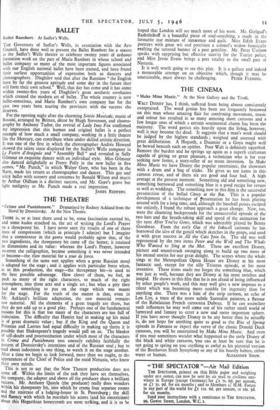THE THEATRE
THERE is, or at least there used to be, some fascination exerted by, and some kudos attached to, the act of writing the Lord's Prayer on a threepenny bit. I have never seen the results of one of these - feats of compression (which in principle I 'admire) but I imagine that a connoisseur in the genre would probably agree that, of the two ingredients, the threepenny bit came off the better; it retained its dimensions and its value: whereas the Lord's Prayer, however reverent the calligraphist, became something it was never intended to become—the rfaw material for a tour de force.
Something of the same sort applies when a great Russian novel is adapted for the stage - and it applies with particular force when, as in this production, the stage—the threepenny bit—is used to the best possible advantage: How clever of them, we feel, to pack so many of the right characters, so much of the right atmosphere, into three acts and a single set ; but what a pity they had not something to put on -the stage which was meant for the stage. For the truth of the matter is that, even in Mr. Ackland's brilliant adaptation, the raw material remains raw material. All the elements of a great tragedy are there, but they do not -add up to a good play. Perhaps one of the fundamental reasons for this is that too many of the characters are too full of indecision. The difficulty that Hamlet had in making up his mind is of great dramatic value ; but if the King and the Queen and Polonius and Laertes had equal difficulty in making up theirs it is possible that Shakespeare's tragedy would pall on us. The blanket of self-doubt and procrastination under which most of the characters in Crime and Punishment toss uneasily exhibits faithfully the pattern of Dostoievsky's intentions and of the Russian soul ; but to read about indecision is one thing, to watch it on the stage another. After a time we begin to look forward, more than we ought, to the appearances of the Chief of Police and the maid Nastasia, who know their own minds.
This is not to say that the New Theatre production does not come off. Within the limits of the task they have set themselves, the company, the adapter and above all the producer share a brilliant success. Mr. Anthony Quayle (the producer) really does wonders within his threepenny bit, into whichie crams four separate rooms and the staircase of a lodging-house in St. Petersburg ; the skill and fluency with which he marshals his actors (and his electricians) about this Hogarthian honeycomb are most striking, and it is to be
hoped that London will see much more of his work. Mr. Gielgud's Raskolnikoff is a beautiful piece of soul-searching, a study in the favourite star mixture of innocence and guilt. Miss Edith Evans portrays with great wit and precision a colonel's widow fanatically exalting the tattered banner of a past gentility. Mr. Peter Ustinov speaks with surprising but effective suavity for the Tsarist police, and Miss Jessie Evans brings a pert vitality to the small part of Nastasia.
It is well worth going to see this play. It is a gallant and indeed a memorable attempt on an objective which, , though it may be
unattainable, must always be challenging. PETER FLEMING.


























 Previous page
Previous page